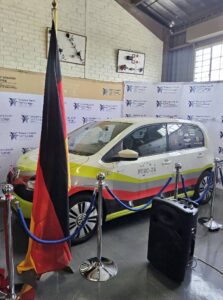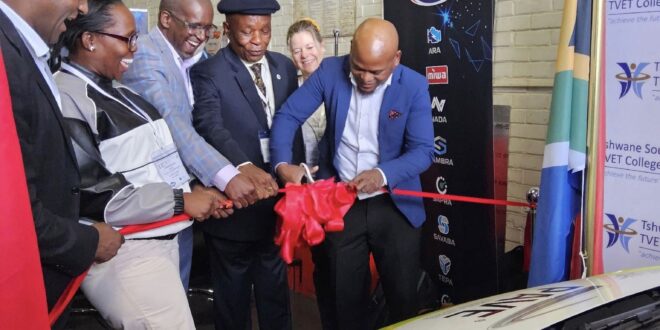
As South Africa moves towards Alternative Energy Vehicles (AEVs), South African automotive manufacturers are expanding the array of brands, models, and derivatives within Electric and Hybrid vehicles. It is therefore imperative that training stays aligned with this trend.
The Retail Motor Industry Organisation (RMI), and the Chamber of Crafts Erfurt, also more popularly known as Handwerkskammer Erfurt (HWK Erfurt), last year agreed to collaborate on a 12-month project ending June 2024 to successfully drive vocational training in the automotive aftermarket.
In February this year, a two-week pilot was conducted at Eastcape Midlands College for about 16 lecturers from 8 TVET Colleges. The second pilot was launched this week on 8 April at Tshwane South TVET College with a full electrical vehicle, the VW E-Up, courtesy of partners Porsche AG.
Louis van Huyssteen, RMI national training director, says the two pilots are designed to assess business needs for vocational training in modern automotive technology, including e-mobility (electric car technology), responding to the changing needs in workplace skills in the automotive aftermarket.
”Frank Oelze, Head of the Vocational Training Center for HWK in Germany concurs emphasising the importance of conducting the necessary needs analysis in preparation for the inclusion of E-mobility into the lecturer training programme in South Africa. “It is critical we continue to involve the TVET colleges as well as the companies in the automotive sector.”
Speaking at the launch, Nomsa Mathye, Deputy Principal: Academic Services at Tshwane South TVET College, underscored the significance of hosting the pilot workshop, highlighting the recognition of the college’s capacity to deliver advanced training programmes of national importance.
She says, ” This is a specialised training initiative aimed at equipping auto mechanic lecturers from TVET colleges nationwide with the latest knowledge and skills in electric vehicle technology. Organised by our partner Handwerkskammer Erfurt, and facilitated by one of their industry experts, this training workshop marks a significant milestone for our college and the automotive education sector. By hosting this event, we have been recognised for our exceptional capacity to conduct advanced training programmes of national importance.”
Mathye confirmed the college was in the process of accrediting its workshops in order for lecturers to provide students with the highest quality education and prepare them for the future of the automotive industry.
The longer-term vision for the auto electrical workshop on campus is to refurbish the facilities to meet international standards for servicing and maintenance of vehicles. This vision can be achieved through partnerships with organisations like the RMI that can collaborate with the college.
Mathye expressed her sincere appreciation to Advocate JT Chiloane, our College Chief Accounting Officer, for his unwavering support and encouragement. “His visionary mindset and commitment to advancing education have been instrumental in fostering partnerships that provide incredible opportunities for our students,” she says.
Advocate JT Chiloane, the Principal of Tshwane South TVET College, expressed his gratitude for the partnership with HWK and RMI. “This workshop represents a significant milestone for our college.” He acknowledges the importance of specialised training on electric vehicles in shaping the future of technical education and expresses his deep appreciation for being entrusted with such a vital role.
Elaborating on the partnership between South Africa and Germany, Rixa von Somnitz-Moreno, a spokesperson for the Germany Embassy in the Economic Cooperation division says in the field of vocational training and job creation, the cooperation centres on strengthening the practical relevance of South African vocational training and therefore enhancing the confidence in the TVET college system as a high quality partner for apprenticeship training that is responsive to the labour market.
“Technical Vocational Education and Training (TVET) colleges are viewed as key vehicles through which large numbers of artisans can be trained,” she says.
Moreno says the German dual system apprenticeship, which combines school-based with industry-based training, is very applicable for TVET colleges because it improves the quality of artisan training at public TVET colleges, builds employer trust in the quality of the public artisan training system, and positions TVET education as an attractive option for young people who are assigned meaningful work under real-life conditions.
“There is a particular focus on supporting the modernisation of curricula, the training of TVET staff, networking and enhancing dialogue and building partnerships between the state and trade and industry, and the integration of technology and creativity in skills development initiatives, emphasising the importance of innovative approaches in enhancing employability and fostering entrepreneurship,” she concludes.
 ..:: AUTO REPORT AFRICA ::..
..:: AUTO REPORT AFRICA ::..




